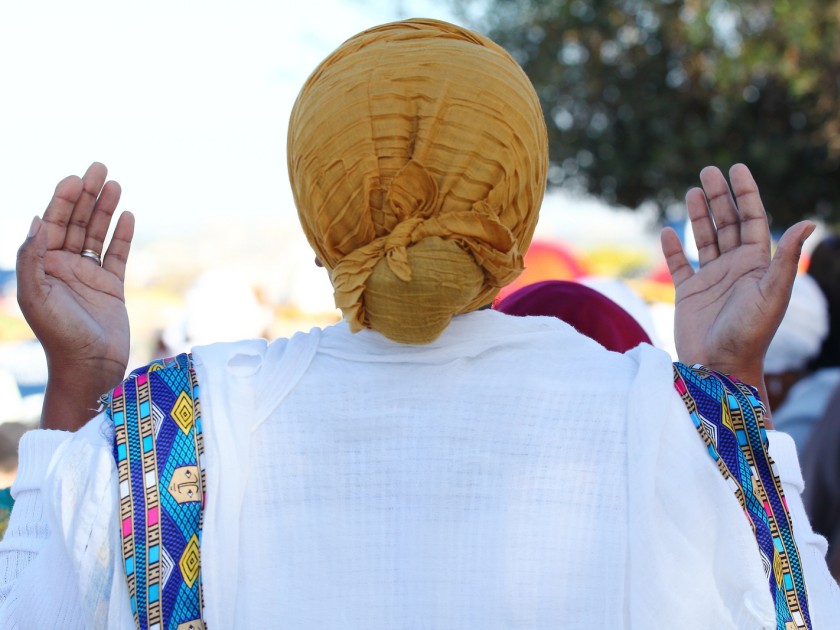Join a community of readers who are committed to Jewish stories
Sign up for JBC’s Nu Reads, a curated selection of Jewish books delivered straight to your door!

Sigd/Səgd celebrated in Jerusalem, 2022
Lizzy Shaanan via WikiMedia Commons
When I arrived in Israel from Ethiopia as a little girl, I learned quickly that language can build a home and it can unmake one. Words from my homeland that carried memory and dignity were reshaped to fit a Hebrew-speaker’s ear. Our sounds were softened, rounded. And slowly, something in us was diluted too.
One of the first and most painful examples was the name of the holiest day in the Beta Israel tradition: Səgd (ስግድ).
In Amharic and Ge’ez, Səgd is almost a whisper: sə + gə + d without intervening vowels. It means to bow in humility, to surrender before God with reverence, to renew the covenant. It is a day of fasting, confession, prayer, and awe far closer to Yom Kippur in spirit than to another festival.
But in Israel, the word became “Sigd.” A vowel was added that does not exist in our languages. A small shift, but one that revealed a larger pattern: a belief that our sounds were too sharp, too foreign, too Ethiopian to belong fully to the Jewish story.
And I must admit: we participated in that softening too.
When people pronounced my family name Mola as Mula I didn’t correct them. When my relative, whose Amharic name Məhrət (ምህረት) means healing and compassion, was called “Mahret,” stripped of meaning, we let it pass. We wanted to fit in, not make trouble.
But language is not cosmetic.
It is memory.
It is ownership.
It is the place where culture either lives or fades away.In Ethiopia, Səgd was a day of immense spiritual power. At dawn, dressed in white, the entire community climbed the mountain. We bowed with our foreheads to the earth, facing Jerusalem. It was a day of reckoning with our mistakes, longing, and hope. A day when the community humbled itself together.
When we arrived in Israel — the dream we carried for generations — Səgd changed. It ceased to be a prayer toward Zion and became a prayer for unity within Zion. A plea for healing fractures, for justice, for recognition. Not symbolic belonging, but real belonging.
As chairwoman of the Association of Ethiopian Jews, in the early 2000s, we fought for Səgd to be recognized as a state holiday. I was unsure at first in our mission; racism in schools and inequities in budgets felt more urgently in need of our attention. But our director general and one persistent lobbyist walked the halls of the Knesset day after day, refusing to give up.
When the law passed in 2008, I understood. Recognition is not symbolic. It is oxygen.
When I arrived in Israel from Ethiopia as a little girl, I learned quickly that language can build a home and it can unmake one.
There is a deeper layer, often forgotten. Səgd reflects the structure in Nehemiah 9:3: “A quarter of the day they read from the Torah,/ A quarter they confessed and bowed before God.”
For centuries, we preserved this exact rhythm through our holiday commemoration: Three quarters of the day devoted to fasting, prayer, confession, and prostration and the final quarter devoted to joy.
For me, this final quarter is the most moving moment of all. A theology that says: We prayed with all our hearts; we confessed; we bowed; and now we celebrate, with equal sincerity.
Because we trust that God, compassionate and merciful, has heard us. This arc from supplication to joy is the living heart of Səgd.
And in that final joyful quarter of the day, something else appears: bread.
Special bread, baked only for holy days. In Ethiopia it was baked in the earth in a pit oven dug into the ground. Today, in Israel, we make it in the oven, but the blessing it invokes remains.
Here is the version I make for Səgd:
Səgd Holiday Bread (Ethiopian-Style Sacred Loaf)
- 4 cups all-purpose flour
- 1 tbsp yeast (or sourdough starter)
- 1 tsp salt
- 2 Tbsp organic honey
- 1 Tbsp olive oil
- 1 – 2 tsp ground hilbeh (fenugreek), not too fine
- 1 tsp whole nigella (black cumin)
- Warm water as needed
Mix, knead well, and let rise until it falls.
Knead again.
Transfer the dough into an oven-safe pot lined with cabbage leaves.
Cover with more leaves.
Bake at medium-high heat for 60 – 80 minutes.
This act of preservation is not only culinary. It echoes a broader revival taking place in this moment. Today, a beautiful restoration is unfolding among young Ethiopian Israelis. They insist on accuracy not as pedantry, but as reclamation. They revive meanings, correct pronunciations, and honor our ancient sounds. They say Səgd (ስግድ) with intention.
And when we restore that sound, we restore more than a syllable.
We restore our history.
Our dignity.
And our full place in the Jewish people.
Shula Mola is an Israeli civil and human rights activist and educator. She is a former Chairperson of the Association for Ethiopian Jews for over 10 years, a co-founder of Mothers on Guard, protesting police brutality against youth of Ethiopian origin, and a board member for the New Israel Fund. She is a Postdoctoral Fellow at Hebrew University of Jerusalem.